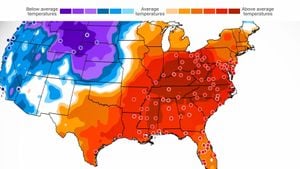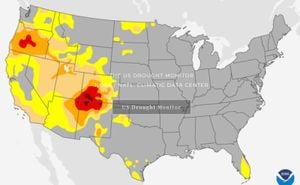Palestinians living in the Gaza Strip are balancing on the edge of cautious optimism and deep skepticism after Donald Trump's victory in the recent U.S. presidential elections. The atmosphere is thick with mixed emotions as Trump, who decisively won against Democratic candidate Kamala Harris on November 5, 2024, takes center stage once again. With over 270 Electoral College votes to his name, he is the first Republican nominee to win the popular vote in two decades. His rhetoric, especially during speeches aimed at states with significant Arab populations like Michigan, has stirred discussions about U.S. policy toward the Middle East and Israel.
Trump's supporters echo the sentiment of hope, asserting his presidency could bring significant changes to U.S.-Middle East relations. During his campaign, Trump criticized Harris sharply, urging voters, "VOTE TRUMP, AND BRING BACK PEACE!" His controversial approach raised eyebrows, reflecting on past policies perceived as favorable to Israel and detrimental to Palestinians. Trump's administration recognized Jerusalem as Israel’s capital—a move condemned widely by Palestinians and the international community.
Yet, for many, particularly those suffering amid Gaza's humanitarian crisis, these hopes remain fragile. The dire situation on the ground, exacerbated by continued military actions, has many questioning whether the new administration will shift longstanding U.S. policies backing Israel's actions. The fear is palpable as many believe U.S. support is directly linked to the violence they experience daily. Trump is set to officially assume office on January 20, 2025, leaving many Gazans to wonder if real change is possible.
Desperate Hopes
Suhad Hussein, displaced and struggling to survive southeast of Deir al-Balah, expressed her plight starkly, saying, "We are exhausted by displacement and the harshness of life. The children are homeless, diseases are spreading, and food and medicine are scarce." Her hopes for change are tinged with skepticism, as she believes the Palestinian people have remained oppressed by the world, noting, "Even Arab countries do not defend Palestinian interests." The approach of winter adds urgency to her desire for the new U.S. administration to intervene and open crossings for humanitarian aid.
Jud Omar Hussein, Suhad’s young son, dreams of basic childhood experiences now lost to the violence around him. "I hope the war stops so we can return to our homes and schools," he shared, his innocence underscoring the tragic impact of continued conflict. These sentiments are echoed by seniors like Abu Ahmed, who starkly maintains the belief: "U.S. policy is based on a fixed strategy. The differences are only in the methods of execution, not the goals." For them, the shift from one U.S. president to another raises more apprehension than expectation.
Despite the tension, some individuals dare to hope for real change. Ahmad al-Maghari, at 33, sees glimmers of potential; he recalled Trump speaking about peace and expressed hope. "We want just peace and immediate end to the war.[...] The continuation of violence is unbearable, and we are desperate for normal life to return." Yet, he, like many, knows hope is not enough; substantial change requires significant action.
Call for Action
The voices from Gaza are unified: anger, despair, and calls for action. Nine-year-old Iman al-Assar, who has lost family members due to bombings, voiced her feelings poignantly, stating: "The war has destroyed our homes and killed my loved ones. I hope the new U.S. president will stop this war and help rebuild Gaza." Rami Habib, 44, urged immediate U.S. intervention to halt what he describes as genocide. He lamented, "We are tired and have no energy left to bear more pain. The Palestinian people are unable to meet even their basic needs."
Meanwhile, nursing student Iman Aliwa, volunteering at Al-Aqsa Martyrs Hospital, highlighted the urgent need for medical supplies and humanitarian aid. Her call was urgent: "We suffer from severe shortages. The wounded need to travel for medical treatment, and we hope Trump will help open the crossings and bring supplies." She captures the grim reality—total disruption of lives and healthcare.
The casualty figures tell a staggering story: since Hamas’s incursion on October 7, 2023, nearly 43,500 people, predominantly women and children, have perished, leaving Gaza's infrastructure at the brink of collapse. With Israel facing accusations of genocide at the International Court of Justice, the crime of war is pivotal amid the destruction, stacking the cards against those who seek stability.
Though Trump’s upcoming term raises eyebrows and reactions range widely across Gaza, one truth remains: the civilian population is hanging on by the thinnest of threads, hoping every word and action from the new administration might just be what they need. For many, even small signs of kindness or change may go miles toward shifting the narrative of despair toward recovery and peace.



